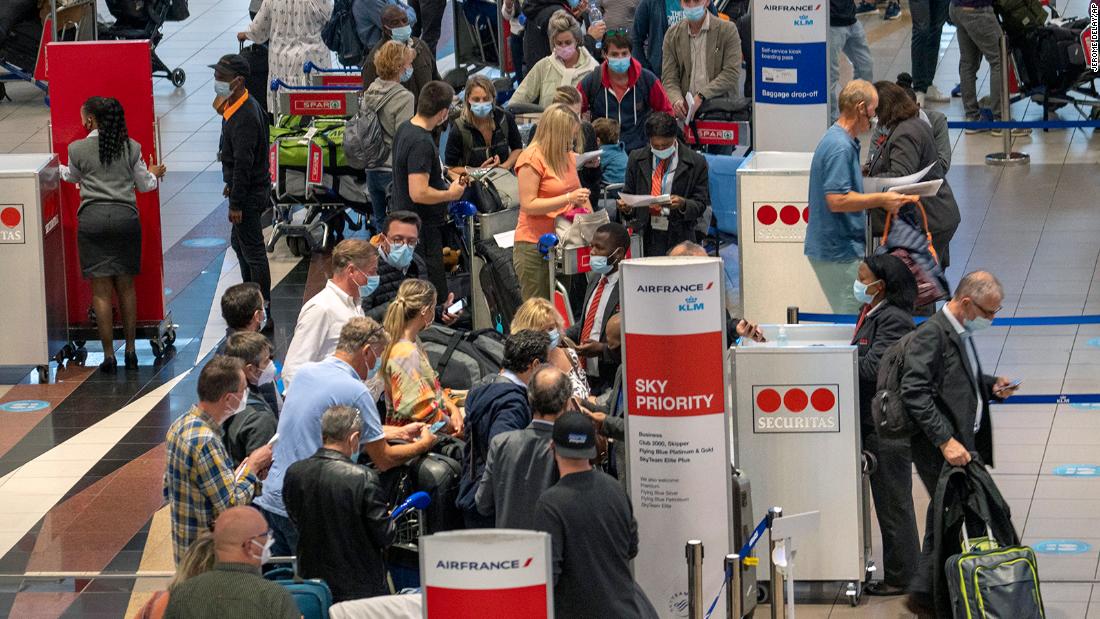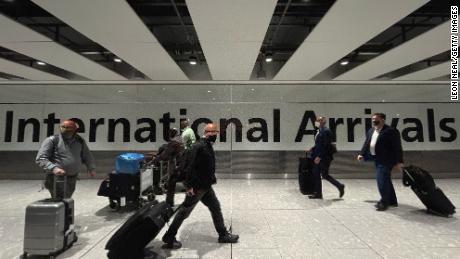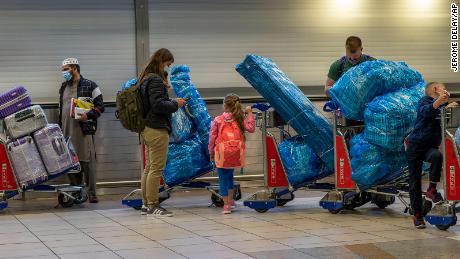As of Friday, the variant was found in South Africa, Botswana, Hong Kong and Belgium, with the European Centre for Disease Prevention and Control said Friday there was a “high to very high” risk the new variant would spread in Europe.
By midday on Saturday, two cases were confirmed in the United Kingdom and dozens more suspected in the Netherlands, Germany and the Czech Republic. The top infectious disease expert in the United States, Dr. Anthony Fauci, also said it was possible the new variant was already in his country but was yet to be detected.
UK’s Secretary of State for Health Sajid Javid said the two cases detected in the UK were linked to travel to southern Africa, the region where the Omicron variant was first detected. “These individuals are self-isolating with their households while further testing and contact tracing is underway,” he added.
German state minister for Hesse Kai Klose said there was a “high probability” that the Omicron variant has already arrived to Germany after a suspected case in a person returning from South Africa. He said a full sequencing needs to be done to confirm the case.
Similarly, health authorities in the Czech Republic are investigating a suspected case of the Omicron variant in a traveller who has recently arrived from Namibia, the Czech National Institute of Public Health said in a statement emailed to CNN.
The institute said that that a PCR test indicated the infection could have been caused by the Omicron variant, but added that a full sequencing of the sample needs to be completed in order to confirm this. It said the sequencing work is underway.
The Centers for Disease Control and Prevention (CDC) said that to date no known Omicron cases have been identified in the United States, and that if the variant emerges, the agency expects that cases would be quickly identified through the nation’s variant surveillance system.
Fauci, the CDC Director, told NBC Saturday, “I would not be surprised if it is [in the US], we have not detected it yet, but when you have a virus that is showing this degree of transmissibility and you’re having travel-related cases they’ve noted in other places already, when you have a virus like this, it almost invariably is going to go all over.”
GGD Kennemerland, the municipal health service responsible for the Amsterdam Schiphol airport, said the positive test results would be examined as soon as possible. Those who tested positive were sent into isolation at a nearby hotel, the Dutch authorities added.
But while WHO designated the Omicron a “variant of concern” on Friday, it stressed that more research is needed to determine whether the variant is more contagious, whether it causes more severe disease, and whether it could evade vaccines.
“This variant has a large number of mutations and some of these mutations have some worrying characteristics,” Maria Van Kerkhove, WHO’s technical lead for Covid-19, said in a statement on Friday.
“Right now there are many studies that are underway … so far there’s little information but those studies are underway so we need researchers to have the time to carry those out and WHO will inform the public and our partners and our member states as soon as we have more information,” she added.
Lawrence Young, a virologist and a professor of molecular oncology at Warwick Medical School in the United Kingdom, said the Omicron variant was “very worrying.”
“It is the most heavily mutated version of the virus we have seen to date. This variant carries some changes we’ve seen previously in other variants but never all together in one virus. It also has novel mutations,” Young said in a statement.
South Africa cut off
The United States, the European Union, the United Kingdom, Australia, Japan, Russia, Brazil, Saudi Arabia, Israel, Egypt, the Philippines, Thailand and a number of other countries already announced or proposed bans on flights from the region.
Most, including the US, have restricted travel from South Africa, Botswana, Zimbabwe, Namibia, Lesotho, Eswatini, Mozambique and Malawi.
The South African government has taken an issue with the travel bans, pointing out in a statement that the Africa Centres for Disease Control and Prevention “strongly discourages” travel bans for people originating from countries that have reported the variant.
“Over the duration of this pandemic, we have observed that imposing bans on travelers from countries where a new variant is reported has not yielded a meaningful outcome,” the statement said.
Scientists have praised South African health authorities for their quick reaction to a Covid-19 outbreak in the country’s Gauteng province, which led to the discovery of the new variant.
When cases in the province started to rise at a higher rate than elsewhere, health experts focused on sequencing samples from those who tested positive, which allowed them to quickly identify the B.1.1.529 variant.
Peacock said the South African health ministry and its scientists “are to be applauded in their response, their science, and in sounding the alarm to the world.”
She added the development shows how important it is to have excellent sequencing capabilities and to share expertise with others. That message was reinforced by WHO, which has on Friday called on countries to enhance their surveillance and sequencing efforts to better understand coronavirus variants.
But Dr. Richard Lessells, an infectious diseases specialist at the University of KwaZulu-Natal in Durban said South Africa was being “punished” for its transparency and ability to pick up the variant quickly and flag the issue to the international health authorities.
“What I found disgusting and really distressing … was not just the travel ban being implemented by the UK and Europe but that that was the only reaction or the strongest reaction. There was no word of support that they’re going to offer to African countries to help us control the pandemic,” he told CNN.
CNN’s Martin Goillandeau, David McKenzie, Ghazi Balkiz, Laura Smith-Spark, Sharon Braithwaite, Antonia Mortensen, Tim Lister and Lauren Lau contributed reporting.









